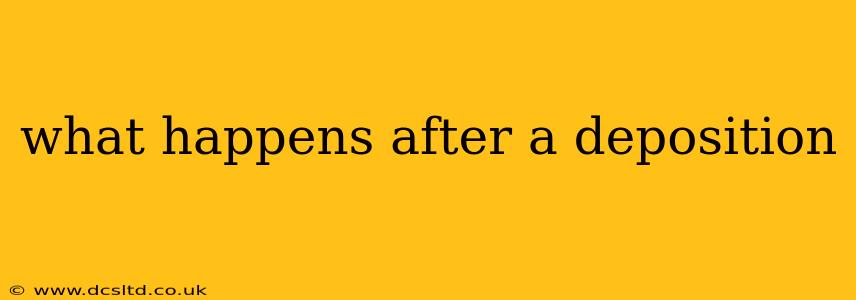Depositions, a critical stage in many legal proceedings, can feel daunting. Understanding what happens after a deposition is just as important as understanding the process itself. This comprehensive guide will walk you through the post-deposition timeline, addressing common questions and concerns.
What is a Deposition Transcript and How Long Does it Take to Receive It?
After a deposition, a court reporter prepares a transcript of the proceedings. This verbatim record is crucial for various reasons, including reviewing testimony, preparing for trial, and identifying potential inconsistencies. The timeline for receiving the transcript varies depending on the length of the deposition and the court reporter's workload, but it typically takes anywhere from a few days to a few weeks. You'll usually receive notification when it's ready, and you may have options for expedited service if needed.
How Are Deposition Transcripts Used?
Deposition transcripts serve several vital purposes:
- Preparation for trial: Attorneys meticulously review transcripts to identify key points, prepare questions for trial, and develop strategies for cross-examination.
- Identifying inconsistencies: Discrepancies between deposition testimony and later statements can significantly impact a case.
- Evidence: The transcript itself can be used as evidence in court, particularly if a witness is unavailable for trial.
- Settlement negotiations: Transcripts often provide valuable insight into the strengths and weaknesses of each side's case, potentially facilitating settlement negotiations.
- Impeachment: Inconsistent statements made during a deposition can be used to impeach a witness's credibility during trial.
What Happens if I Disagree with Something in My Deposition Transcript?
While the transcript is intended to be an accurate record, errors can occur. If you identify discrepancies or inaccuracies, you should immediately notify the court reporter. They have a process for correcting errors, often involving a certification process. More significant disputes may require legal intervention. It's crucial to act swiftly to address any concerns.
Can I Make Corrections to My Deposition Transcript?
No, you cannot generally make substantial corrections to your deposition transcript after it's been certified. Minor errors, such as typos or misspellings, can usually be corrected with the court reporter's assistance. However, attempting to alter the substance of your testimony is inappropriate and potentially unethical.
What if the Other Side Objects During My Deposition?
Objections during a deposition are common. However, the witness generally continues to answer the question unless the objection is based on privilege (like attorney-client privilege). The objections are noted in the transcript, and the judge will rule on their validity later, if necessary. The mere presence of an objection doesn't necessarily prevent the information from being considered later in the case.
What Happens After the Deposition – Next Steps in the Legal Process?
Following a deposition, the legal process continues toward trial, settlement, or dismissal. The next steps might include:
- Further discovery: Additional depositions, interrogatories, or document requests might be exchanged between parties.
- Motion practice: Either side might file motions based on the information gleaned from the deposition.
- Mediation or arbitration: Attempts to settle the case outside of court are common.
- Trial: If settlement efforts fail, the case proceeds to trial.
What Happens if I Forget Something Important After My Deposition?
If you remember crucial information after your deposition, immediately inform your attorney. They can advise you on the appropriate steps, which might involve a supplemental deposition or other legal maneuvers. It's important to be thorough in your preparation to minimize such occurrences.
This guide provides a general overview. The specifics of what happens after a deposition will vary based on the jurisdiction, the nature of the case, and the specific circumstances. Always consult with your attorney for guidance tailored to your individual situation.
